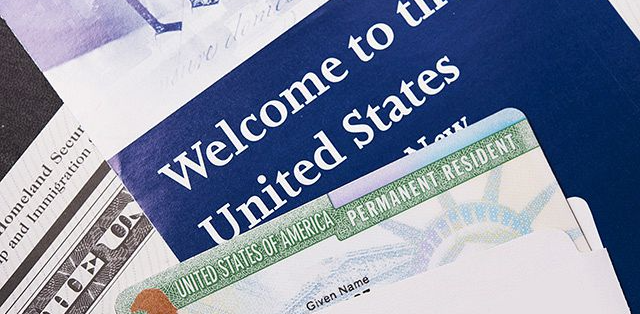Family
Family
Find valuable information and updates about family immigration and how citizens and permanent residents can sponsor their loved ones to be able to legally live and work in the U.S. with visas, green cards and citizenship. Our experienced immigration professionals share their expertise on ever-changing immigration policy and related issues. Be sure to check back often and subscribe for up-to-date information!
Subscribe
Subscribe

Advance parole is a travel document that permits you to travel outside the United States for temporary travel and return to the United States . Applicants for advance parole need to file Form I-131, Application for Travel Document with U.S. Citizenship and Immigration Services (USCIS) and pay the filing fee. When the application is approved, USCIS issues the applicant a Form I-512L, the advance parole document. The document must be presented to immigration officials to seek admission into the United States after traveling abroad. There are several ways a person can qualify for and obtain advance parole. Applicants for adjustment of status, DACA recipients, and individuals who need to travel for urgent humanitarian reasons are three common types of applicants that can apply for advance parole , however there are more. Applicants for adjustment of status can apply for advance parole when they file their green card application or when the green card application is pending. Adjustment of status applicants must obtain advance parole before traveling outside the United States to avoid an issue with the green card application. Obtaining advance parole through an adjustment of status application does not require an emergency or humanitarian purpose for travel. Note, when you file for advance parole through an adjustment of status application the filing fee for Form I-131 is not required. DACA recipients may also apply for advance parole to travel abroad for humanitarian reasons or for employment or educational purposes only. Humanitarian reasons include medical attention or treatment, visiting a sick relative or for a relative’s funeral services. Educational purposes include studying abroad, academic research and more. Employment purposes include work, training, meetings, interviews, and other specific work assignments. Certain individuals may also apply for advance parole due to an urgent humanitarian reason or to further a significant public benefit. To show that the travel is due to humanitarian, education, or employment reasons, the applicant must provide proof of such to USCIS. As mentioned, these are the three most common ways to obtain advance parole, but they are not the only ways. If you have questions about other ways to obtain advance parole, if you think you qualify for advance parole or have questions about your eligibility, please schedule a consultation with one of our experienced attorneys and we will be more than happy to assist you.

Your conditional resident status is only valid for 2 years. In order to prevent losing lawful status in the United States, you must submit Form I-751, Petition to Remove Conditions on Residence, 90 days before your conditional green card expires. It is critical that you file Form I-751 to remove the conditions in a timely manner because if it is not, you may risk being left without status and the U.S. Department of Homeland Security may issue you a Notice to Appear and place you in removal proceedings before an Immigration Judge.

Picture this : your significant other finally proposed to you and you are excited, not only for wedding planning but to star t your green card process! One thing to decide before you pop the champagne and start vetting wedding vendors, do I apply for a K1 visa and then start the green card process or do I start the marriage green card process right away? Most people aren’t sure how to answer this question. So when do you apply for a K1 visa versus simply starting the marriage green card process? Keep reading to find out.

Click here to read this article in Portuguese and Spanish If you and your spouse were married for less than 2 years at the time of your I-485 ( Adjustment of Status ) interview and your application was approved, your lawful permanent resident status is conditional and a separate petition to remove those conditions (I-751 petition) must be filed within 90 days of the expiration date on your Green Card. An I-751 petition is a joint petition, filed by the Green Card holder and their spouse, that requests USCIS remove the conditions and issue you permanent resident status and a new 10-year Green Card. However, what if after filing the I-751 petition, you and your spouse decide to get divorced? In such situations, the Green Card holder can request a waiver of the joint petition filing requirement and submit this request with their I-751 petition. Even if you are requesting an I-751 waiver, you must still show that the marriage was originally entered into in good faith. This means that you will still need to prove to USCIS that you entered into the marriage for love and not just to obtain a Green Card. Evidence of good faith can include, but is not limited to, the marriage certificate, joint documents, birth certificates of children born of the marriage, etc. Documentation that can/should be submitted with your I-751 waiver request include copy of your green card, documentation regarding the circumstances surrounding the end of your marriage, evidence that the marriage was entered into in good faith, copy of the divorce decree (or evidence that divorce proceedings have been initiated if not yet final), statement from you regarding the circumstances, etc. USCIS reviews waiver requests on a case-by-case basis. Current USCIS policy guidance indicates that if a waiver request is made and the divorce is not yet final, USCIS should issue a Request for Evidence (RFE) with a response period of up to 87 days. In the RFE, the officer will request that you provide a copy of the final divorce decree and a statement from you officially asking that the I-751 petition be converted to a waiver application (if not already provided), along with any other documents they deem necessary to decide the case. As long as you can provide these documents to USCIS by the response deadline, the officer can amend the I-751 petition indicating that you are eligible for a waiver based on the termination of the marriage and can adjudicate the petition as such without the need to re-file the application. USCIS will then evaluate whether or not the good faith requirement has been met and may schedule the case for an in-person interview. If the application is approved, then you will be issued your 10-year Green Card. If the application is denied, then your case may be referred to immigration court and you may be placed in removal proceedings. I-751 waiver cases are a complicated matter. If you or someone you know find themselves in a situation like the one mentioned above, please contact our experienced immigration attorneys at Santos Lloyd Law Firm for assistance with your case.

But what should you expect at the interview?
In some ways this may feel almost like a job interview, but it isn’t. The purpose of the interview is to verify that you and your spouse have filed a petition based on a bona fide or real marriage. The difference between this and a job interview is that at this interview you and your spouse will be sworn in and anything you answer will be considered testimony. The officer will verify your information on the I-130 Petition for Alien Relative and the I-485 Applicant to Register Permanent Residence updating any information such as address or employer. The officer will also ask questions about your relationship, something that may seem odd to U.S. born citizens.

It is a petition that can be filed by a Lawful Permanent Resident or U.S. Citizen Spouse on behalf of their immigrant spouse to obtain a green card. In order to file the petition, the individuals must be legally married, no specific period of time is required, but the length of the marriage at the time of the interview may affect if a 2 year or 10-year green card is issued if the case is approved.

Under the current American Immigration System, there are three major paths to becoming a Lawful Permanent Resident, popularly known as a " Green Card Holder ." One is: Family Ties . This means that a qualifying family member, such as a spouse, parent or child, sponsors your application. A second path is: Employment Ties. Meaning that your employer sponsors your application. And third is: Humanitarian Reasons. This is the least common of the three paths, and involves getting residence through a humanitarian immigration program, such as asylum or refugee status. This article explores the first path, obtaining a green card based through marriage, and is the story of my personal experience, getting my green card through marriage to my husband.
Most Recent Posts
Most Recent Posts

U.S. Citizenship and Immigration Services (USCIS) has announced a major change to the H-1B cap selection process. Under a final rule issued on December 29, 2025, USCIS will replace the long-standing random H-1B lottery with a wage-weighted selection system that favors higher-paid and more complex positions. The rule is scheduled to take effect on February 27, 2026 , just ahead of the fiscal year 2027 H-1B cap registration season, unless delayed by legal challenges. If implemented, USCIS is expected to release additional guidance explaining how employers must submit registrations under the revised process. This change marks one of the most significant reforms to the H-1B program in recent years. Up until 2025, all registrations were treated equally once the annual cap was reached. Under the new system, selection odds will be tied to wage levels based on the U.S. Department of Labor’s Occupational Employment and Wage Statistics data. All H-1B registrations will still be placed into a single selection pool, but registrations tied to higher wage levels will receive multiple entries into that pool, increasing their likelihood of selection. Lower wage levels will receive fewer entries, making selection less likely but not impossible. H-1B wage levels are not determined solely by salary. Each wage level reflects the complexity of the job, the level of responsibility involved, and the education and experience required . Entry-level positions involving routine duties and close supervision are generally classified at the lowest wage level, while positions requiring independent judgment, advanced skills, and significant responsibility fall into higher wage levels. The highest wage level is reserved for roles that involve expert knowledge, strategic decision-making, and substantial leadership or technical authority. USCIS is expected to closely scrutinize selected petitions to ensure that the wage level claimed during registration is supported by the job duties and salary offered in the petition. Any discrepancies between the registration and the petition may result in requests for evidence, denials, or enforcement action. With the elimination of the purely random lottery, employers should begin preparing early by carefully evaluating job descriptions, wage levels, and overall H-1B strategy. Accurate classification and thoughtful planning will be essential under this new wage-based selection system. If you are an employer considering H-1B sponsorship, or a foreign professional wondering whether your position may qualify under the new wage-based system, consulting with experienced immigration counsel is more important than ever. Santos Lloyd Law is actively advising clients on H-1B cap registrations and strategy under the new rules. To discuss your options or determine whether you may qualify, contact our office to schedule a consultation.

During the recent administration there has been an increase in issuance of Requests for Evidence for EB-1A petitions for those of Extraordinary Ability. A Request for Evidence is a request that is made by USCIS that should explain how the evidence is deficient in proving the criteria argued and what additional evidence needs to be provided by the applicant to meet the criteria. EB-1A petitions are already normally subject to higher scrutiny because their approval is the first step needed to apply for Lawful Permanent Residence or a green card. USCIS normally requires not just evidence but that the evidence be provided with context and information to show why it matters in a particular field. For example, if you were providing evidence of your membership in an organization that requires outstanding achievements of its members, just providing evidence of the membership is not enough. You must explain what that membership is and provide background information on the organization granting the membership. You also need to provide evidence on the criteria that is used to select the members, information on those who select the members to show that they are recognized experts, other documentation such as articles about the membership organization to show its importance, and any other relevant evidence and background information to show that the criteria is met. A request for evidence being issued prior to the current administration was not uncommon, but in the current climate it is more surprising to not receive a request for evidence for this type of case. It is important to remember that a request for evidence is not a denial. Depending on the validity of the information in the request and the substance some Requests for Evidence can be overcome, and the case be approved. It is important to carefully review the request and note if there are any errors in the content and application of the regulations by USCIS. If you have an attorney, you should work with them and make sure that you provide any evidence you think may be helpful. Although there is a deadline by which a response must be submitted, attention to detail and patience will go a long way when dealing with having to respond to a request for evidence. If you believe you may qualify for this type of visa, please feel free to contact our office.

Once you have connected with a college program, have been admitted to the school, and deemed eligible to compete athletically, you will need to secure an F-1 student visa in order to actually attend your new college and begin your time as a student athlete. The first step in the visa process is to receive your Form I-2
Santos Lloyd Law Firm, PC
Email: info@santoslloydlaw.com
Phone: (949) 316-0078
Fax: (949) 271-4500
Office Visits by Appointment Only:
4340 Von Karman Ave, #110
Newport Beach, CA 92660
Phone: (949) 316-0078



